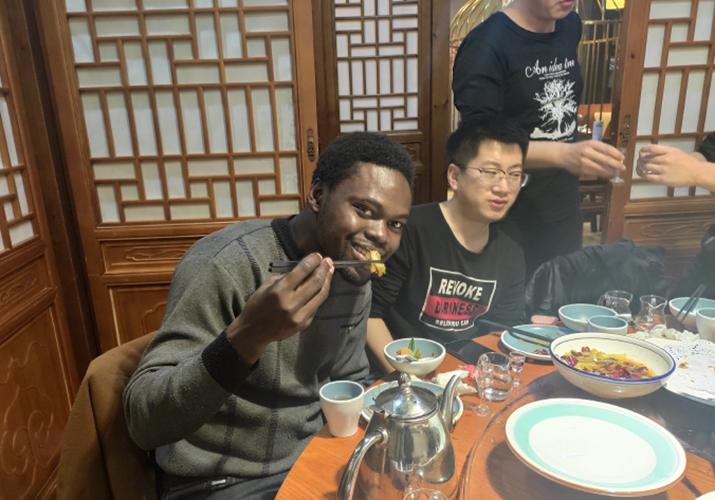|
||||||||||
| Home Nation World Business Opinion Lifestyle ChinAfrica Multimedia Columnists Documents Special Reports |
|
||||||||||
| Home Nation World Business Opinion Lifestyle ChinAfrica Multimedia Columnists Documents Special Reports |
| ChinAfrica |
| The Chinese Lunar New Year celebrations in eyes of an African student |
| I am happy that I can now celebrate the Chinese New Year with a better understanding of the meanings attached to this festive period. With all confidence I certainly look forward to celebrating more Chinese festivals during the course of the year |
| By Samuel Daniel VOL. 13 MARCH 2021 ·2021-03-22 |

I grew up in a small community called Mubi in Adamawa State, Nigeria, and like most people the new year celebration is something we anticipate.
Generally, the new year festival is always fun and lively in my country. It comes with various entertaining activities such as dancing competitions, lighting up the streets with fireworks, friendly wrestling matches between communities as a sign of unity amongst neighboring villages, and a family reunion dinner on New Year's Eve.
To mark the days-long celebrations, most households in Nigeria serve rice as the main dish which is usually accompanied by several favorite local dishes such as Egusi soup, Banga soup and Tuwo.
For many Christian families in my country, the eve of a new year is a time of intense prayer and worship at church, whilst for other followers it is a time to observe a month-long fast in preparation for the plans of the coming year.
However, my narrative on the new year celebration "ideology" changed when I got to China. During my Chinese language classes, I was surprised when I learnt from my teacher that the Chinese lunar calendar is different from the Gregorian calendar.
She explained that the Chinese New Year is also known as the Spring Festival, and is celebrated at the beginning of a Lunar calendar. I became curious and zealous to know more about the great Chinese festival.
This year's Spring Festival celebration will not just be memorable but eye-opening. It all began during the first week of February, when we started cleaning and decorating the entry points to our university pavilions, offices and dormitories with some red paper cuttings indented with the Chinese character fu, meaning good fortune.
Afterwards, our research supervisor along with other senior researchers hosted a reunion dinner for us at a restaurant in Beijing. We were treated to several traditional Chinese New Year delicacies consisting of noodles, dumplings, fish, spring rolls, glutinous rice cake, sweet rice balls, and fruit. During the feast, I asked my Chinese lab mate about the significance of the food that had been served to us. He humorously answered, "Samuel, everything you see on this table has a symbolic meaning in Chinese culture to bring good luck for the coming year.''
He went on to explain the logic. "First of all, fish symbolizes having a surplus for the coming year because in Chinese custom the word for fish sounds like "surplus." Dumplings and Springrolls signify a wish to bring wealth, good treasure, and prosperity in the coming year. The Glutinous Rice Cake symbolizes a growth in all ramifications of life because the Chinese word for glutinous rice cake sounds like "getting higher yearly."
He went on to explain that the Sweet Rice Balls signified family reunion in Chinese culture, as the word for sweet rice ball and the round shape of rice balls are associated with reunion. When I asked about the noodles, he explained that they symbolize a wish for longevity and happiness.
A special selection of fruit was also served along with the dinner. I learnt that these symbolize fullness and wealth. From my friend I learnt that the Chinese character for orange sounds like "success." Also, the Chinese character for pomelo sounds like "to have," and same like "again." So, eating them is thought to bring continuous prosperity.
He then said, "the Spring Festival is a time when everyone in China takes vacation and travels back home for a family reunion as this event encourages love and bonding within the family.''
Thanks to my supervisor and Chinese friends. I am happy that I can now celebrate the Chinese New Year with a better understanding of the meanings attached to this festive period. With all confidence I certainly look forward to celebrating more Chinese festivals during the course of the year.
(Print Edition Title: Celebrating The Year of The Ox)
The author is a Nigerian studying at the University of Chinese Academy of Sciences
| About Us | Contact Us | Advertise with Us | Subscribe |
| Copyright Beijing Review All rights reserved 京ICP备08005356号-5 京公网安备110102005860号 |